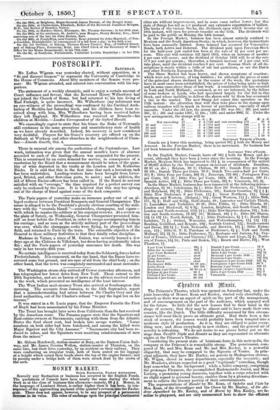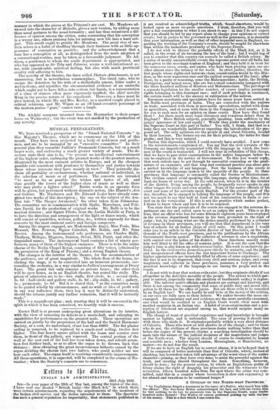4ratrto nut Zugir.
The Princess's Theatre, which was opened on Saturday last, under the joint lesseeship of Messrs. Kean and Keeley, started very cheerfully, in- asmuch as there was an aspect of spirit on the part of the management, and of encouragement on the part of the audience, which augured well for the future. So little did the new lessees find to their hand in the shape of scenery, that they may be almost said to have made their own country, like the Dutch. The little difficulty occasioned by this circum- stance will most likely prove an ultimate good. Had there been a fair stock of scenery, the lessees would probably have been tempted into a mediocre style of production. As it is, they are obliged to paint every- thing new, and dress everybody in new clothes ; and the general air of novelty is refreshing. We do not desire to see pieces better put on the stage than Twelfth Night and Hamlet as they are represented on alternate nights at the Princess's Theatre.
Considering the present state of histrionic force in this metropolis, the company at the Princess's is remarkably strong. The government, com- posed of Mr. and Mrs. Kean and Mr. and Mrs. Keeley, is a powerful oligarchy, that may be compared to the Signoria of Venice. As prin- cipal adjuncts, they have Mr. Harley, sui generic in Shaksperian clowns; Mr. Wigan, clever in many departments, especially the eccentric ; and Mr. Meadows, always respected as a good "legitimate" comedian, though kept somewhat in the background ; while a ballet company, comprising the grotesque Flexmore, the accomplished Mademoiselle Aunol, and Miss Lectern, a promising young danseuse, together with a corps selected with no slight regard to personal beauty, enables them by a pleasing divertisse- ment to relieve the literary portion of their entertainments.
The representations of Hamlet by Mr. Kean, of Ophelia and Viola by Mrs. Kean, of the Gravedigger and the Clown by Mr. Harley, of Sir An- drew Agueeheek by Mr. Keeley, and of Maria by Mrs. Keeley, are fa- miliar to playgoers, and are only enumerated here to show the efficient manner in which the pieces at the Princess's are cast. Mr. Meadows ad- vanced into the character of ;taloa°, gives a new version, by adding more than usual pertness to the usual formality ; and has thus occasioned a dif- ference of opinion among the critics, some contending that his conception is a wrong one, others praising him for infusing new life into a hard sub- ject. This result ought to gratify Mr. Meadows. The great vice of mo- dern actors is a habit of shuffling through their business with as little ap- pearance of conception as possible ; and the acknowledgment that a man has a conception at all, as distinguished from the mere adoption of a conventional routine, may be taken as a favourable judgment. Mr. Ad- dison, a gentleman to whom the senile department is appropriated, and who has appeared as Sir Toby and Felonies, seems a well-intentioned ac- tor' with considerable artistical feeling, but also with much provincial crudity still adhering to him.
The novelty of the theatre, the farce called Platonic Attachments, is not unamusing, but is nevertheless commonplace. The timid rake, who to escape the detection by his wife of a shillyshally amour, hides under a melon-frame, and mystifies the circumstantial evidence of an umbrella which ought not to have flillen into certain fair hands, is a representation of a class of sinners often more vigorously typified ; the chief novelty Wing in the precise mature of his expedients. However, a farce must be poor indeed, in which Mr. and Mrs. Keeley, as a married couple placed in critical relations, and Mr. Wigan as an off-hand eccentric personage of the modern genius "gent," cannot raise a laugh.



























 Previous page
Previous page